Filter by
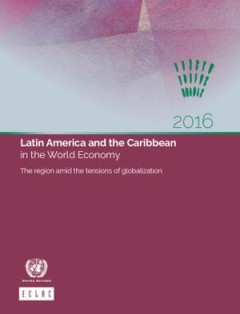
Latin America and the Caribbean in the World Economy 2016 : The region amid…
The 2017 edition of Latin America and the Caribbean in the World Economy reviews international and regional developments from a trade perspective, describing the principal global economic trends and structural changes in international trade, the main areas of trade growth and the changes these drive in the region.
- Edition
- -
- ISBN/ISSN
- 9789211219333
- Collation
- -
- Series Title
- -
- Call Number
- 650
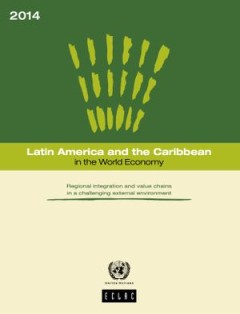
Latin America and the Caribbean in the World Economy 2014 : Regional integrat…
The 2014 edition of Latin America and the Caribbean in the World Economy: Regional integration and value chains amid challenging external conditions has four chapters. Chapter I examines the main features of the international context and their repercussions for world and regional trade. Chapter II looks at Latin American and Caribbean participation in global value chains and confirms that the r…
- Edition
- -
- ISBN/ISSN
- 9789211218688
- Collation
- -
- Series Title
- -
- Call Number
- 650
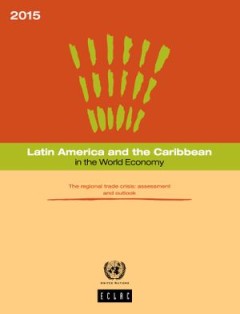
Latin America and the Caribbean in the World Economy 2015 : The regional trad…
With external conditions sluggish and highly uncertain as the global economy still struggles to shake off the effects of the economic crisis of 2008-2009, the Latin American and Caribbean region is not isolated from these effects and is projected to record a small drop in gross domestic product (GDP) in 2015, followed by a weak recovery in 2016. Against this backdrop, 2015 will be the third con…
- Edition
- -
- ISBN/ISSN
- 9789211219012
- Collation
- -
- Series Title
- -
- Call Number
- 650
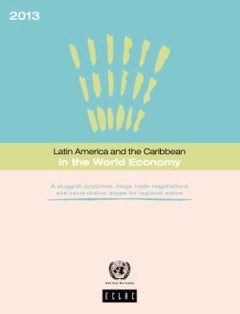
Latin America and the Caribbean in the World Economy 2013 : A sluggish postcr…
The 2013 edition of Latin America and the Caribbean in the World Economy is subtitled “A sluggish postcrisis, mega trade negotiations and value chains: scope for regional action” and is made up of three chapters. Chapter 1 reviews the main features of the persistently weak global economy and lacklustre world trade and then turns to global and regional trade trends and prospects. Chapter II …
- Edition
- -
- ISBN/ISSN
- 9789212211169
- Collation
- -
- Series Title
- -
- Call Number
- 650
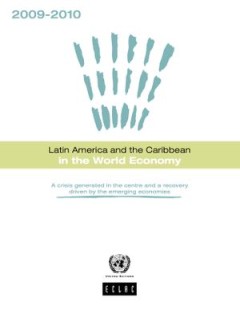
Latin America and the Caribbean in the World Economy 2009-2010 : A crisis gen…
The 2009-2010 edition of Latin America and the Caribbean in the World Economy, which discusses the crisis generated in the developed world and the recovery driven by the emerging economies, is divided into five chapters. Chapter I undertakes a short- and medium-term analysis of the post-crisis international economic situation, concentrating on its implications for international trade prospects …
- Edition
- -
- ISBN/ISSN
- 9789211217421
- Collation
- -
- Series Title
- -
- Call Number
- 650
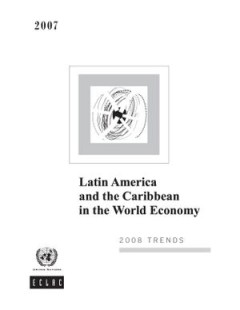
Latin America and the Caribbean in the World Economy 2007 : 2008 trends
This year's edition of Latin America and the Caribbean in the World Economy is divided into seven chapters. Chapter I contains an analysis of recent trends in the main industrialized and emerging economies and reviews the possible impact of the financial crisis that began in the United States on the world economy and on the economic and trade performance of Latin America and the Caribbean. The …
- Edition
- -
- ISBN/ISSN
- 9789211216769
- Collation
- -
- Series Title
- -
- Call Number
- 650

Holy hip hop in the City of Angels
In the 1990s, Los Angeles was home to numerous radical social and environmental eruptions. In the face of several major earthquakes and floods, riots and economic insecurity, police brutality and mass incarceration, some young black Angelenos turned to holy hip hop—a movement merging Christianity and hip hop culture—to “save” themselves and the city. Converting street corners to open-ai…
- Edition
- -
- ISBN/ISSN
- 9780520968790
- Collation
- -
- Series Title
- -
- Call Number
- 306.4 ZAN h

The Hmong of Australia : Culture and Diaspora
The Hmong are among Australia’s newest immigrant populations. They came as refugees from Laos after the communist revolution of 1975 ended their life there as highland shifting cultivators. The Hmong originate from southern China where many still remain, and others live in Vietnam, Thailand and Burma. Hmong refugees are now also settled in the USA, Canada, France, Germany and French Guyana. A…
- Edition
- -
- ISBN/ISSN
- 9781921666957
- Collation
- -
- Series Title
- -
- Call Number
- 305.895 942 094 HMO
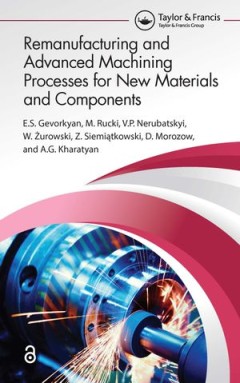
Carbon-Based Smart Materials
Presents technologies and key concepts to produce suitable smart materials and intelligent structures for sensing, information and communication technology, biomedical applications (drug delivery, hyperthermia therapy), self-healing, flexible memories and construction technologies. Novel developments of environmental friendly, cost-effective and scalable production processes are discussed by ex…
- Edition
- -
- ISBN/ISSN
- 9783110477740
- Collation
- -
- Series Title
- -
- Call Number
- -
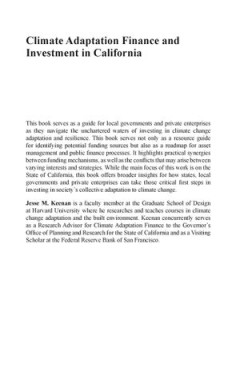
Climate Adaptation Finance and Investment in California
This book serves as a guide for local governments and private enterprises as they navigate the unchartered waters of investing in climate change adaptation and resilience. This book serves not only as a resource guide for identifying potential funding sources but also as a roadmap for asset management and public fi nance processes. It highlights practical synergies between funding mechanisms, a…
- Edition
- -
- ISBN/ISSN
- 9780367026073
- Collation
- -
- Series Title
- -
- Call Number
- 650 KEE c
 Computer Science, Information & General Works
Computer Science, Information & General Works  Philosophy & Psychology
Philosophy & Psychology  Religion
Religion  Social Sciences
Social Sciences  Language
Language  Pure Science
Pure Science  Applied Sciences
Applied Sciences  Art & Recreation
Art & Recreation  Literature
Literature  History & Geography
History & Geography